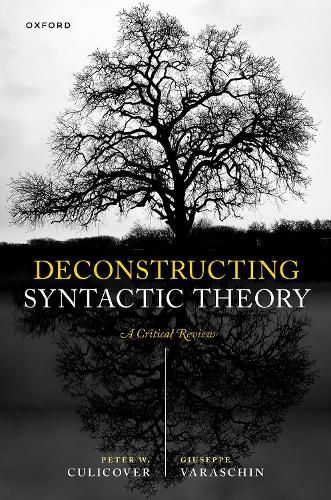Readings Newsletter
Become a Readings Member to make your shopping experience even easier.
Sign in or sign up for free!
You’re not far away from qualifying for FREE standard shipping within Australia
You’ve qualified for FREE standard shipping within Australia
The cart is loading…






Deconstructing Syntactic Theory is a critical examination of the assumptions and methodologies of contemporary derivational syntactic theory. The study ranges from the earliest work inspired by Chomsky's Syntactic Structures and Aspects of the Theory of Syntax to the present-day Minimalist Program.
The book begins with an examination of the relationship between syntactic structure, linear order, and meaning, and the role of uniformity, in motivating derivational analysis that assume movement and invisible structure. A central property of such analyses is that they are cryptoconstructional: construction-specific stipulations are assumed in order to derive the form and meaning of expressions. The second part looks at a range of technical and empirical problems of derivational syntax, which require theoretical stipulations and devices to properly constrain cryptoconstructional analyses. The focus is particularly on problems relating to movement and problems of invisibility.
In Part III, the authors turn to the question of the independent justification of syntactic structure, arguing that much hierarchical structure is not only unnecessary, but also does not yield optimal analyses for a number of grammatical phenomena. Part IV focuses on the use of syntax to account for phenomena that are arguably not syntactic; it concludes that using syntax to model semantic phenomena is at best not necessary, and at worse empirically inadequate. Similarly, using syntax to model morphological relations works only for a narrow subset of cases and cannot be sustained more generally without causing significant internal problems. The book concludes with a review of minimalism, laying out aspects of the logic of the Minimalist Program, its assumptions, and their motivations and consequences. The authors argue that minimalism is best achieved by a leaner theory of linguistic representations, along the lines of the constructional architecture of Simpler Syntax, as proposed by Culicover and Jackendoff (2005).
$9.00 standard shipping within Australia
FREE standard shipping within Australia for orders over $100.00
Express & International shipping calculated at checkout
Deconstructing Syntactic Theory is a critical examination of the assumptions and methodologies of contemporary derivational syntactic theory. The study ranges from the earliest work inspired by Chomsky's Syntactic Structures and Aspects of the Theory of Syntax to the present-day Minimalist Program.
The book begins with an examination of the relationship between syntactic structure, linear order, and meaning, and the role of uniformity, in motivating derivational analysis that assume movement and invisible structure. A central property of such analyses is that they are cryptoconstructional: construction-specific stipulations are assumed in order to derive the form and meaning of expressions. The second part looks at a range of technical and empirical problems of derivational syntax, which require theoretical stipulations and devices to properly constrain cryptoconstructional analyses. The focus is particularly on problems relating to movement and problems of invisibility.
In Part III, the authors turn to the question of the independent justification of syntactic structure, arguing that much hierarchical structure is not only unnecessary, but also does not yield optimal analyses for a number of grammatical phenomena. Part IV focuses on the use of syntax to account for phenomena that are arguably not syntactic; it concludes that using syntax to model semantic phenomena is at best not necessary, and at worse empirically inadequate. Similarly, using syntax to model morphological relations works only for a narrow subset of cases and cannot be sustained more generally without causing significant internal problems. The book concludes with a review of minimalism, laying out aspects of the logic of the Minimalist Program, its assumptions, and their motivations and consequences. The authors argue that minimalism is best achieved by a leaner theory of linguistic representations, along the lines of the constructional architecture of Simpler Syntax, as proposed by Culicover and Jackendoff (2005).